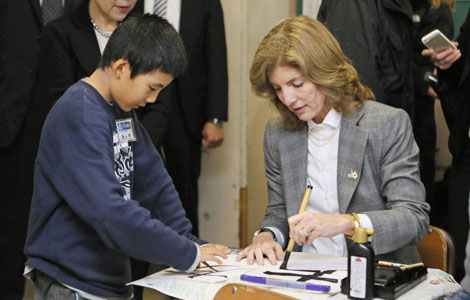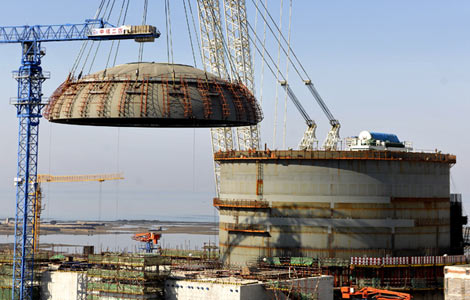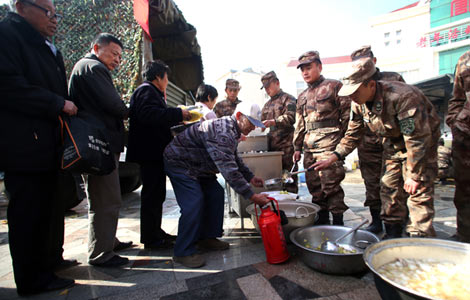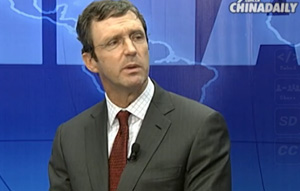Investment rules eased under reform
Updated: 2013-11-26 01:23
By ZHAO HUANXIN and LI YANG (China Daily)
|
||||||||
Project controls to be loosened and price-setting minimized by govt
The central government is relaxing its grip on the level of enterprise investment that requires its approval, with as much as 60 percent no longer needing central authorization, according to an official.
The move comes 10 days after the release of a historic reform document charting China's course for the next decade.
The National Development and Reform Commission has vowed to further loosen its control on investment projects and to minimize the number of areas in which the government sets prices.
At a news conference on Monday, Lian Weiliang, vice-minister of the commission, said a new version of the directory of investment projects requiring government approval will be released very soon.
This will further reduce the range of corporate investment needing review and approval from the commission and other government agencies.
Investment projects, except for those concerning national security, eco-safety, exploitation of strategic resources, or of vital public interest, will be determined by enterprises in accordance with the law and without the need for government approval, according to the reform blueprint issued by the Central Committee of the Communist Party of China on Nov 15.
Lian said more than one-third of the reform issues detailed in the package cover the economic system, meaning that the commission faces a huge responsibility and arduous task.
The commission has broad administrative and planning control over the economy.
"We have abolished or transferred 44 items requiring administrative approval to local governments this year, and we are on the way to phasing out another batch of items," Lian said.
He said that for the shrinking number of projects and items that still require central government approval, the commission is working out a reviewing system that will make the procedure highly efficient.
The measures include carrying out procedures online and setting a time limit for their completion, Lian said.
The commission is drafting the outlines of economic system reform in 2014, he said.
He said the development of a mixed-ownership economy is a focus of attention in the reform package.
Under the Party decision, more State-owned enterprises and others will be allowed to develop into mixed-ownership enterprises.
Private capital will be allowed to take stakes in projects featuring investment by State-owned capital, with employees of multi-ownership enterprises able to hold shares in their companies.
Lian said the mixed-ownership economy will stimulate the vitality and creativity of enterprises that are diversely owned.
Chen Fengying, director of the Institute of World Economics Studies with the China Institutes of Contemporary International Relations, said that encouraging private capital to become a stakeholder in mixed-ownership enterprises won't change the dominant position of China's public ownership economy.
But private enterprises that have been marginalized for a long time in many fields now face unprecedented development opportunities, she said.
Chen said the sectors to open up may include energy and resources, railways and telecommunications.
"But the government will surely reserve the industries concerning national security for State-owned enterprises, as is the practice in any other countries," she said.
Zhang Chunxiao, a researcher in industrial economics with the Chinese Academy of Governance, said the development of State firms and the private economy in China in the past 10 years has laid a solid foundation for reform.
Zhang said the establishment of the State-owned Assets Supervision and Administration Commission in 2003 was the real start of China's State-owned enterprises reform.
"The government did not have the conditions to open some of the State-owned fields and even SOEs to private capital back then. The substantial development of SOEs and private enterprises gives the government more room to draw on each other's strengths."
Zhang said encouraging private investors to become stakeholders in SOEs in some sectors will enable more State-owned assets to strive to find more markets abroad.
"The government should choose the most outstanding strategic partners to join SOEs to form mixed-ownership enterprises," Zhang said.
Contact the writers at zhaohuanxin@chinadaily.com.cn and liyang@chinadaily.com.cn

 Focus on China-Africa research
Focus on China-Africa research
 In photos: NE China blanketed by heavy snow
In photos: NE China blanketed by heavy snow
 Caroline Kennedy visits Japan's disaster-struck regions
Caroline Kennedy visits Japan's disaster-struck regions
 Volcano eruption leads evacuation in Indonesia
Volcano eruption leads evacuation in Indonesia
 Nuclear power 'to fall short of demand'
Nuclear power 'to fall short of demand'
 Experts doubt smog linked to low birthrate
Experts doubt smog linked to low birthrate
 Residents near pipeline blast demand relocation
Residents near pipeline blast demand relocation
 Doggy, please be my ears and listen for me
Doggy, please be my ears and listen for me
Most Viewed
Editor's Picks

|

|

|

|

|

|
Today's Top News
Obama heckled in Chinatown
Trimble helping China grow
Gallup poll a bit hazy over air quality satisfaction
More Americans say Obama can't manage govt
China, Romania seal deals
Kennedy visits disaster areas
Rules on investment eased
US move in ITA talks criticized
US Weekly

|

|






